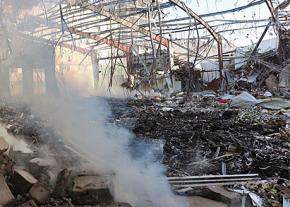Saudi Arabia inflicts a nightmare in Yemen
examines the role of the U.S. and other powers in Saudi Arabia's savage assault on Yemen, in an article for the Australian newspaper Red Flag.
THE DEATH toll from the U.S.-backed Saudi assault on Yemen has skyrocketed in recent weeks.
The most recent atrocity was the bombing of a funeral, at which hundreds had gathered to mourn victims of previous Saudi air strikes. It was a "double-tap" strike, in which two bombs drop on the same location, with just enough time between them to annihilate anyone arriving at the scene to help the victims of the first bomb. At least 140 people died, and more than 600 more were wounded.
This is just the latest incident in a 19-month war by the Saudis against the Houthi rebels. They are under attack simply because they have received some aid from Iran, Saudi Arabia's regional rival. The Houthis are not a progressive force; they have sought to gain power in an opportunistic alliance with Ali Abdullah Saleh, the tyrant toppled by the revolution in 2011.
Stung by Iran's nuclear deal with the U.S., the Saudis hope to contain Iran's expansion and reassert their own geopolitical relevance. At least 5,000 civilians so far have paid the ultimate price for this imperial power play. And there is no end in sight.

This carnage would be unthinkable without U.S. support. The U.S. has provided crucial logistical, military and intelligence assistance from day one. The U.S. military has refueled more than 5,700 Saudi aircraft during the course of the war, according to the U.S. Central Command. It also sent a team of advisers to Riyadh to help plan the air campaign against the rebels.
Earlier this month, the U.S. increased its involvement, attacking three separate targets with Cruise missiles--the first direct U.S. attack on Yemeni soil. It is likely that more will follow, especially when the more hawkish Clinton takes control of U.S. foreign policy.
The so-called cease-fire in Yemen is a sham. Just like the equivalent deals reached in Syria, it is an attempt to ease pressure on the Saudis at a time of intense media scrutiny. Al Jazeera has reported that 11 were killed in the first day after the truce.
THE U.S. has long been an uncritical supporter of the Saudi government, but growing tensions following the Iran deal have given Washington extra motivation to allow the Wahhabi regime a carte blanche.
It's not only the U.S. that is implicated in this massacre. Many of the bombs raining down on the people of Yemen were purchased from the UK. Britain has sold $3.3 billion in advanced weaponry to the Saudis since the war began, including illegal cluster bombs, which scatter bomblets across the ground.
These lie unexploded until they come into contact with some unsuspecting person, often a civilian. They are banned under the 2008 Convention on Cluster Munitions, which Britain has signed and ratified. The U.S. and Saudi Arabia have not signed the treaty.
Australia is also complicit in Saudi war crimes. The website of the Department of Foreign Affairs and Trade describes the relationship between the two nations as one of "mutual trust." The Saudi monarchy is called an example of "good governance" and a source of "stability and peace." The relationship was exemplified following the death of king Abdullah, when flags across Australia were flown at half-mast.
While Russia's crimes in Syria are broadcast around the world, little is said about those committed by the West and its allies in Yemen. This hypocrisy reflects the cynicism with which the media construct narratives to suit the interests of their ruling class sponsors.
These narratives are driven by geopolitics; Western allies can do no wrong, while so-called enemies are barbarians.
The reality is that all sides are guilty of horrific war crimes.
Ruling classes across the world were threatened by the Arab Spring, which destabilized capitalist relations in the region and posed an alternative of genuine democracy and economic justice. They responded by trying to contain and defeat by any means necessary the revolutionary struggles of workers and the poor. This included the co-option of sections of the movement, the cultivation of sectarian divisions among the masses and, where necessary, crude military repression.
The events in Yemen prove that Western governments are just as implicated as Putin in this violent, counterrevolutionary orgy.
Only a return of revolutionary struggle across the Middle East, assisted where possible by strong solidarity movements in the West, can turn this horrific situation around.
First published at Red Flag.


